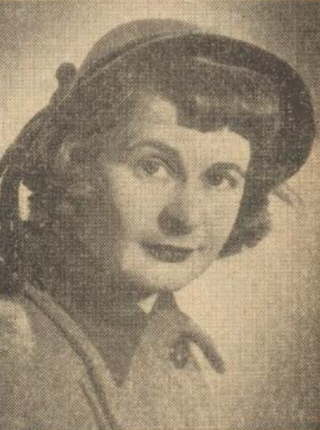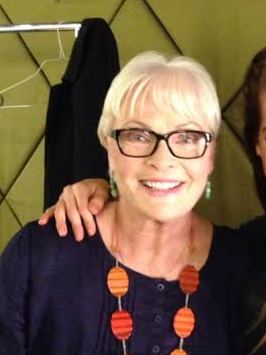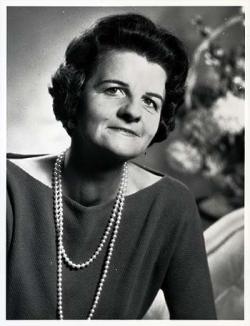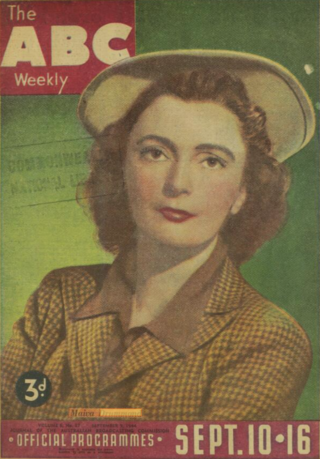
Patricia Ethell McDonald was an Australian radio actor and actor of stage and screen, primarily in small screen roles in television soap operas.

Bettina Catherine Welch was a New Zealand-born Australia-based actress, primarily in radio and theatre and of the latter in television roles. She was best known for her role in television soap opera Number 96 as Maggie Cameron, a scheming businesswoman and fashion editor.

Gwendoline Jean Plumb AM BEM, was an Australian performer of international appeal, actress and comedian active in literally every form of the art genre, including revue, pantomime, vaudeville, interviewing, game shows, live appearances, compering, radio production, scriptwriting and acting, television soap opera and mini-series and made-for-TV film.
Patricia Anne Haddy, credited also as Anne Hardy, was an Australian actress, television presenter and voice artist, who worked in various facets of the industry including radio, stage and television. She was married to actor and scriptwriter James Condon.

Rowena Wallace is an English-born Australian stage and screen actress, most especially in the genre of television soap opera. She is best known for her Gold Logie-winning role as conniving Patricia "Pat the Rat" Hamilton/Morrell/Palmer in Sons and Daughters, being the first soap star to win the Gold Logie. After leaving the series and being replaced in the role by Belinda Giblin, Wallace returned in the final season as Patricia's sister Pamela Hudson.
Efftee Studios was an early Australian film and theatre production studio, established by F.W. Thring in 1930. It existed until Thring's death in 1935. Initially Efftee Films was based in Melbourne and used optical sound equipment imported from the US.
Sheila Kennelly also credited as Sheila Kenneally, is a British-born Australian retired character actress of theatre and music hall, television and film, with a career spanning over 50 years. From the late 1950s onwards, her early career was based exclusively in theatre and she didn't start her screen career until the late 1960s becoming well known for her roles in TV soap operas, serials, sitcoms and mini-series.
Elaine Joyce Knoesen better known professionally as Elaine Lee, was a South African-born actress of radio and theatre and stage. She made her film debut in her native South Africa in 1968, but became best known in Australia for her role of fashion designer Vera Collins Sutton in the 1970s television soap opera Number 96.

John Sidney Lockwood was a British variety entertainer, comedian and actor, who also became notable in Australia after emigrating to that country.
Philippa Baker, credited also as Phillippa Baker is an Australian retired actress of radio, theatre and television in series and teleplays and telefilms
Vivienne Garrett is an Australian-based theatre, film and television actress. She is a theatre director, acting and voice coach and also a qualified yoga instructor and therapist. She was born in Sydney and now lives in Western Australia. Garrett graduated from the National Institute of Dramatic Art (NIDA) in 1970.
Elisabeth Wilma Burton Kirkby, alternatively Elizabeth Kirkby, is a British-born Australian retired politician, actress, radio broadcaster, producer, director and screenwriter.

Dame Doratea Alice Lucy Walkden Fitton was an Australian pioneering theatre entrepreneur, actress of stage and film and theatrical director and producer who established with 19 other actors The Independent Theatre Ltd. in North Sydney, New South Wales in 1930, which operated for forty-seven years.

Lynette Curran is an Australian actress known for many roles in Australian television series and films, including the soap opera Bellbird, and the films Country Town (1971) and Bliss (1985).

Ethel Muriel Ashton, known professionally as Queenie Ashton, was a character actress, born in England, who had a long career in Australia as a theatre performer and radio personality, best known for her radio and television soap opera roles, although she did also feature briefly in films.
Moya O'Sullivan Macarthur was an Australian-born actress who worked both locally and briefly in the United Kingdom. She was best known for her long-running role as the popular character Marlene Kratz in the soap opera Neighbours between 1994 and 1997. Alex Fletcher from Digital Spy made Marlene their "DS Icon" on 7 January 2011, calling her a legendary and special character. Fletcher also stated that "Marlene, played by the delightful Moya O'Sullivan, was a crucial cog in the Golden Age of Neighbours in the '90s."

Lynn Foster (1914-1985), was a playwright, radio producer and writer, a script editor and television writer. She was the first woman in Australia both to direct and write a major national radio show, this being the serial "Big Sister".
Number 96: The Movie is an Australian drama film, released in 1974 and based on the television soap opera of the same title that was then running on the 0-10 network. The film features nearly all the show's regular cast, and was created by the show's creative team, Cash Harmon Productions with the screenplay by David Sale and Johnny Whyte and directed by Peter Benardos and Brian Phillis.

Maiva Drummond was an Australian actress of stage and radio, known for her part in the long-running ABC radio serial she starred as Jean Lawson in radio serial The Lawsons in the late 1940s and its longer running successor series Blue Hills as Rose Bishop, from 1949 until 1976, both series written by Gwen Meredith
"Shadow of a Pale Horse" is a television play that was produced for Australian TV by Sydney station ATN-7, it was also shown in Melbourne on station GTV-9, as this was prior to the creation of the Seven Network and Nine Network. "Shadow of a Pale Horse" aired on 17 September 1960 in Melbourne and Sydney.










